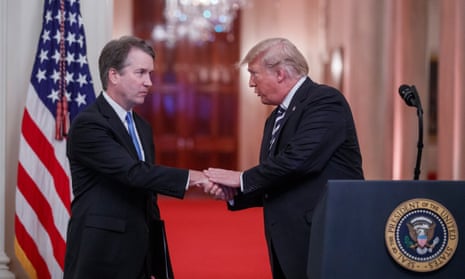On 21 September 2018, at the peak of the #MeToo movement that had supposedly shattered the silence around the sexual assault and harassment of women, 75 women, most of them white, convened in Washington DC to profess their support for the embattled supreme court justice nominee, Brett Kavanaugh.
A psychology professor, Christine Blasey Ford, had claimed Kavanaugh had sexually assaulted her decades earlier when she was just 15. Ford’s testimony was buttressed by two other women with similar allegations, but this was not enough to stop Kavanaugh being confirmed.
Led by his former colleague Sara Fagen, who referred to Kavanaugh as “a person of honour, integrity … and strong moral character … a good father, a good husband and a good friend”, those 75 Women for Kavanaugh were joined in spirit by many more across the country.
The following month Quinnipiac University published an online poll that found only 46% of white women believed Ford, compared with 83% of black people overall and 66% of Hispanics. Though no gender breakdown for non-whites was provided, the numbers revealed a stunning discrepancy between white women and people of colour.
The picture gets even starker when white men are added to the tally: only 32% of white men thought Ford was telling the truth. Overall, people of colour were almost twice as likely to believe a white woman making a sexual assault allegation against a white man.
What could make so many white women dismiss the credible claims of a fellow white woman? Likewise, what could make 63% of white women vote for Roy Moore, the Republican Senate nominee with multiple allegations of sexual assault of underage girls against him? Or 53% for a self-professed “pussy-grabber”?
These voting patterns of white women have stunned white women and women of colour. Those who had expected a different outcome from the 2016 US presidential election concluded that these women had sided with their race over their gender, choosing their whiteness over their womanhood.
But we were wrong.
The academic and author Kyla Schuller argues that rather than betraying their womanhood, these women were performing it. Schuller says White Womanhood has been a key stabilising feature of western civilisation. Although not as visible as that of their male counterparts, their role was nonetheless equally pivotal to the success of European settler-colonialism.
White women, Schuller writes, smooth over “the flow of sensation and feeling that makes up the public sphere, ensuring that white men … are susceptible only to further progress”. In other words, White Womanhood acts as a buffer between whites and non-whites. Serving as the virtuous, innocent face of western civilisation, white women have historically kept power firmly in white hands by defending and denying its violence. Or as the Australian Indigenous academic and author Aileen Moreton-Robinson so succinctly put it in Talkin’ Up To the White Woman: “White women civilised while white men brutalised.”
The removal of Indigenous children from their families both in Australia and the United States, for example, was largely implemented by white women. These colonial maternalists, as the historian Margaret Jacobs dubbed them, learned to leverage their status as both a privileged and subordinate class in order to “simultaneously collaborate with and confound colonial aims”.
The stolen generations was “largely a feminine domain, defined primarily around mothering [and] targeted at Indigenous women”. By framing the removal of Indigenous children as “women’s work for women”, the maternal colonialists flouted the rule against white women working outside the home, and secured white domination over the Indigenous population.
How and why has this history of the role played by white women been largely neglected in favour of a narrative that positions colonialism and imperialism as the domain of white men alone?
Part of the answer lies in the manipulation of discourse. Our tendency is to interpret concepts such as White Man and White Man’s Burden too literally. Although white society hinged on a strict binary between men and women, the term “man” was and remains a catch-all for all genders. In other words, the White Man and the White Man’s Burden refer not only to white males but to white society as a whole. White women were also “burdened” with the responsibility to civilise and subjugate the inferior races of the world, a burden many took on with great gusto.
White women were not bystanders to the global colonial project, but because they were subordinate to and often suffered at the hands of white men, their role has largely slipped under the radar in favour of a misleading discourse that has placed them on almost equal footing with the populations they helped to colonise.
Today we see white feminists adopt anti-racism discourse to denounce “mediocre white men” and “white male supremacy”, thus continuing the legacy of both confounding and collaborating with colonial aims by temporarily distancing themselves from white power.
By pinning all culpability on white men, white women – whether wittingly or unwittingly – whitewash their role in colonisation and the oppression of women of colour by equating their gender oppression with colonialism.

This is what black and brown women mean when we say we cannot separate our gender from our race: we have never been oppressed only by patriarchy, and so a feminism that claims to be for all women must be built on an explicitly anti-racist platform. Anything else runs the risk of reasserting whiteness because it can only ever benefit white women.
White women continue to reap the benefits of the default to innocence they have been granted – but only when this innocence can be used to bolster whiteness as a system of power. Women for Kavanaugh demonstrates the pivotal role White Womanhood still plays in the maintenance of this system, but for some white women this privilege comes at a catastrophic cost. The price white women pay for masking the violence of white civilisation is to in turn be disbelieved when they are brutalised by it.
